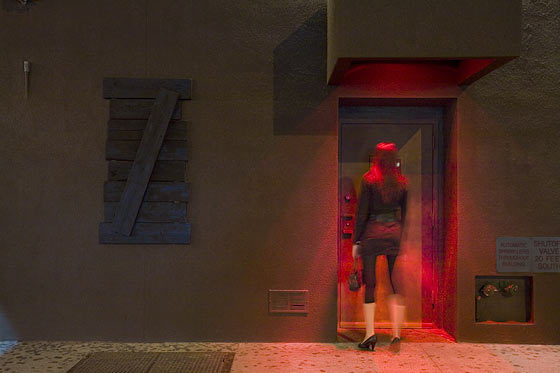 |
(Photo: Jerry Spagnoli) |
Deep in the wilds of Chelsea, there is a door. The door has a screen, and the jet-black eye of a promoter behind that screen, peeping out to gauge your social viability. Are you a model? Or a billionaire? It will be hard to get in otherwise.
Around midnight, the most beautiful young models in the city arrive, squired in quickly, their backs with shoulder blades like arrows disappearing inside. Door, as the nightclub is creatively called, popped up late this summer. No one is supposed to know it’s there. It is where moguls go: After the Yahoo board meeting, Jerry Yang and David Filo came by. Another night in the fall, Sergey Brin and Larry Page were there. Supermarket billionaire Ron Burkle, Virgin head Richard Branson, and Steve Bing, the down-to-earth Democratic donor who inherited nearly a billion dollars from his real-estate-magnate grandfather, the developer of some of the most beautiful Art Deco buildings on Park Avenue and the West Village. Advance men for President Clinton. Few other guys can get in, except for a couple of model wranglers, those handsome, usually South American guys who round up models at their apartments and herd them to nightclubs. Promoter Danny A., a friend of Ron Burkle’s, runs this place—he even got to go on a trip to Israel with President Clinton. The wranglers are the only people in here not having fun: One hand on a mojito, they are nervous as they text madly on the phone to more girls, more girls, more girls.
For the rest of the city, the door is closed. A few handsome bankers wait on the sidewalk outside the club for a half-hour, scraping their shoes. “I guess I’m a zero-value-added person in this equation,” says one, stepping away, disappointed.
At the very pinnacle of the New York social scene these days is the billionaire, once a reclusive character who secretively moved world markets from his castle on the hill but now is more likely to be dining at a booth next to you. They’re everywhere: This year, for the first time, everyone on the Forbes 400 list was a billionaire, up from thirteen billionaires in the early eighties. One can imagine them, swathed in Pyrex, looking down from their apartments in new designer buildings at our tenement buildings and bobbing umbrellas, as though the world outside were some vast boho terrarium.
Now that it seems you need a million dollars just to stay alive, the cultural imagination has been captured by a billion. “I’ve met six billionaires!” crowed a friend of mine, counting them on his hands, and then correcting himself—“Seven!” Our mayor, of course, is a billionaire five times over, with seven homes, a few worth $10 million, and a Florida estate he bought for his daughter to strengthen her equestrian training. Over brunch on a recent Sunday, my girlfriends and I chatted about their Saturday night out—this one talked to one of the Dells; that one sat next to Stewart Rahr, the pharmaceutical mogul and owner of the most expensive home in the Hamptons; and everyone saw Ian Schrager.
“He’s not a billionaire!” huffed one of my friends, outraged at our ignorance.
To be a billionaire is to be radically free. You are your own galaxy. You make your own rules, hang out with the former president, send tourists to space. Billionaire investor Jeffrey Epstein, who lives in the largest dwelling in Manhattan, a 51,000-square-foot palace on 71st Street—though his business, naturally, is located on a 70-acre private island in the Virgin Islands—was humiliated this summer when his lifestyle was made public. Epstein was known to be a womanizer: He usually travels with three women, who are “strictly not of our class, darling,” says a friend. They serve his guests dinner on his private 727, and are also there for touching.
But it seems that he was also interested in younger women: Over the past few years, a then-17-year-old Olive Garden waitress, Haley Robson, brought at least five high-school girls between the ages of 14 and 16 over to Epstein’s house in Palm Beach to “massage” him, which meant watching him masturbate and even allegedly having sex. Epstein’s defense seems to be that he didn’t know the girls were minors, and that he is “very passionate about massage,” as one of his lawyers says.
Those who know Epstein say he’s unfazed by his travails. “He’s totally open about his life: His life is about making money and living an erotic life, and his escape isn’t alcohol or drugs—it’s sex,” says a friend. “I was talking to him the other day, and he said to me that he was doing well and working steadily—between massages.”

